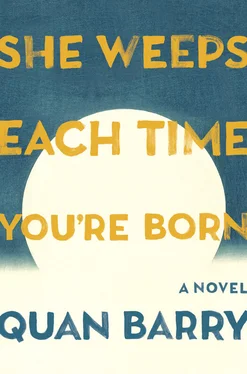On the other side they scrambled out one at a time. As he held the boat steady for the girl, Tu realized there was a smell coming from her. He didn’t know what it could be. He imagined it had something to do with sorrow, though, despite the grimness of her physical appearance, the girl seemed animated and darkly beautiful, as if she were on her way to the happiest day of her life, her happiness in stark contrast to the landscape. Everywhere the world was charred. The bones of trees stood like primordial signposts warning of pestilence and death. In the moonlight the earth looked blackened like the skin of a fish.
The three of them walked single file without speaking. At one point they passed a burned shack with one of its walls caved in as if a car had driven into it. In spots the ground was still smoldering. Tu had to hold his hand up in front of his nose. It was obvious there were bodies inside.
A few hundred feet down the road something glimmered in the distance, but he couldn’t be sure what it was. When they got closer, he could see it was a dead pig, the body completely charred, the long gleaming tusks exposed all the way up to the root where they were fused tight to the yellow jaw. The old woman picked up a stick and whacked it on the flank. From somewhere deep inside the animal Tu could hear things stirring. By the time he realized what was happening, they were already pouring out through the desiccated orifices of the face. A few streamed out of the shriveled ears. Bees. Honey bees. In the moonlight each one silvery like a coin. The sound of the bees’ thrumming a dark electricity.
The air filled with the vibrating swarm, the bees pouring out, the pulsing mass coming on and on without end. Tu could feel their papery wings brushing against his face. It lasted only a minute, and yet it seemed like hours, their wings soft as wind. He had heard of such things happening in the land of the dead. Quickly he touched the side of his neck to make sure his heart was still beating. He found it easily, his pulse hammering.
None of them were stung.
Finally there was the same bend in the road, the one he always remembered coming around on his way home from the fields. He thought of the last time he’d been there. How he had arrived at night, the darkness like a cloak, and how he found her sitting under a sugar-apple tree singing softly to herself. And here he was again. There was the same sugar apple she’d been sitting under and beside it a mound of fresh earth, an empty rice bowl propped in the dirt.
The simple wooden hut he’d built with his own two hands was torn apart. Two of the walls were dismantled, the splintery wooden boards missing. The truth began to present itself. Maybe he had always known. The girl rushed into the dark hut as if her heart were waiting for her, black hair streaming like a flag. What does she think is here, Tu asked, but the old woman just followed her granddaughter inside.
There was no reason to go in. The room was empty. No sign of his wife or mother. The ashes in the fire pit were long cold. A few pots and woven baskets hung on what was left of the walls. Underneath a shelf a broken jar lay empty. In a corner a tin bucket sat half full of water, his mother’s empty hammock swinging in the breeze.
Tu sank down in the dirt. He waited for the tears to come, but nothing came. He and Bà had always been close. Somehow she had always sensed him, had always known what was happening to him even when they were apart, the scar on her chest often hot to the touch. The sugar-apple orchard was still smoldering, the orchard Bà’s pride and joy. When the tears still wouldn’t come, he sat back. A strange feeling of hopefulness fluttered in his stomach.
Then he heard a scratching, the sound of fingernails scraping on a door. He jumped up and ran through one of the missing walls, tapping on the floor with his foot. When he found the spot, he dropped to his knees and began moving the dirt with his hands. He lifted a board, the earth yawning open. The girl raced around and around the room, her hair flying, but when she saw who it was, her face dropped.
Bà rose out of the earth, her eyes completely white. Mon chéri , she said. Tu felt like a child as the tears wet his cheeks. Within minutes Bà had a fire going and some leftover rice boiling in a kettle.
And so they waited, each for their own reasons, each with their own thoughts. Bà sat with her dragon pipe clenched between her lips, the pipe’s eyes burning as she scoured an old pot with sand, her face still grimy from her internment. Qui and Huyen were off in one of the remaining corners, the old woman untangling her granddaughter’s hair. To Tu this was the makeshift vigil for his dead wife. He sat in what was left of the doorway looking off at the mountains. Even in the moonlight, ash still hung in the air. He thought of the first time he’d ever seen her. It was evening. She was riding her bicycle. In the road a small boy was driving three water buffalo to their night field. For a moment she stood up on her bicycle, pumping hard to pass the boy and his animals. Then her hat blew off as if plucked from her head by an invisible hand, her long black hair flying loose in the wind as she kept pedaling, the hat sailing behind her and landing in the road. He watched as the lead buffalo stepped on it. How she had gotten off her bicycle and walked back, picking up the smashed thing in her hands. Thinking she was all alone, she had cradled it in her arms. But he had been there, watching from a ditch by the roadside where he had been relieving himself. Her hair blowing loose as if she were standing on a cliff overlooking the sea. It had only been last year. She was sixteen.
Then somewhere in the long night a noise began. The sound of something banging, a door slamming shut over and over. At first the sound was faint, then the noise changed and filled the air. Tu looked to his mother, unsure of what he was hearing. Even Bà with the things she knew that she shouldn’t know moved her head from side to side as if tracking a housefly and waiting for it to land. Outside, the night was filling with bats.
Qui was the first to locate the noise. She pulled herself up out of the dirt, moving like a woman out of balance, chest-heavy, her stained shirt glistening in the moonlight. In the doorway she stepped over Tu and walked outside to the mound of earth. At the foot of the sugar-apple tree she cocked her head and closed her eyes. She stood holding her hands in front of her chest as though cradling something until the two old women followed her out to the grave.
It was impossible, but finally Tu allowed himself to acknowledge what he was hearing. From the doorway he stood and watched the women massing in the yard. Something dove past his head. He turned and ripped a plank from one of the ragged walls and marched toward the grave. The women stepped back. He began shoveling the earth with the board. The fresh dirt moved easily. In less than ten minutes he hit something.
A box. Look closer and realize it has been hastily nailed together with sun-bleached planks from the one-room house where your mother lived with your grandmother, the old woman’s eyes knitted with clouds. Wait until the top of the box has been lifted off, the body bag unzippered to fill your tiny lungs with the first clean air you have ever inhaled, breath sugary sweet. Know that the world doesn’t always smell like this, ash and soot, though every time you smell it you will flash on the sudden feeling of lying on someone’s stony breast. Let the man who is your father lift you out of the darkness and up into the moonlight. Look closely at his face, the birthmark on the edge of his scalp. You will not see him again for many years if at all.
See these four faces as they peer at you, one of the old women with tears in her ruined eyes. Wonder who all the other faces belong to who are crowding in to see your perfect form. Wonder why you have been chosen to speak for all of them, tens of hundreds of thousands of millions. In a country full of ghosts, begin learning how to distinguish between the voices of the bodied and the voices of the spectral.
Читать дальше












